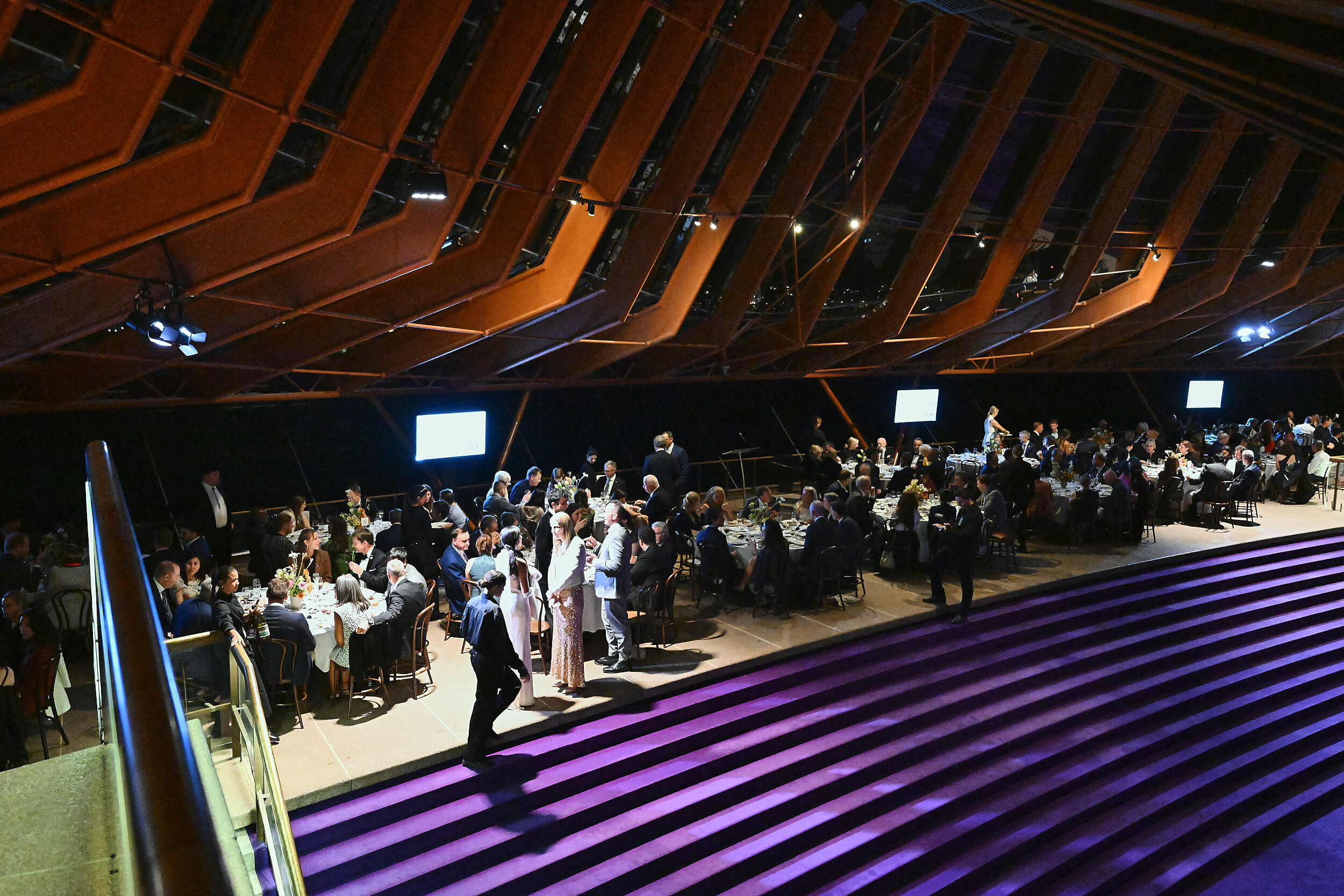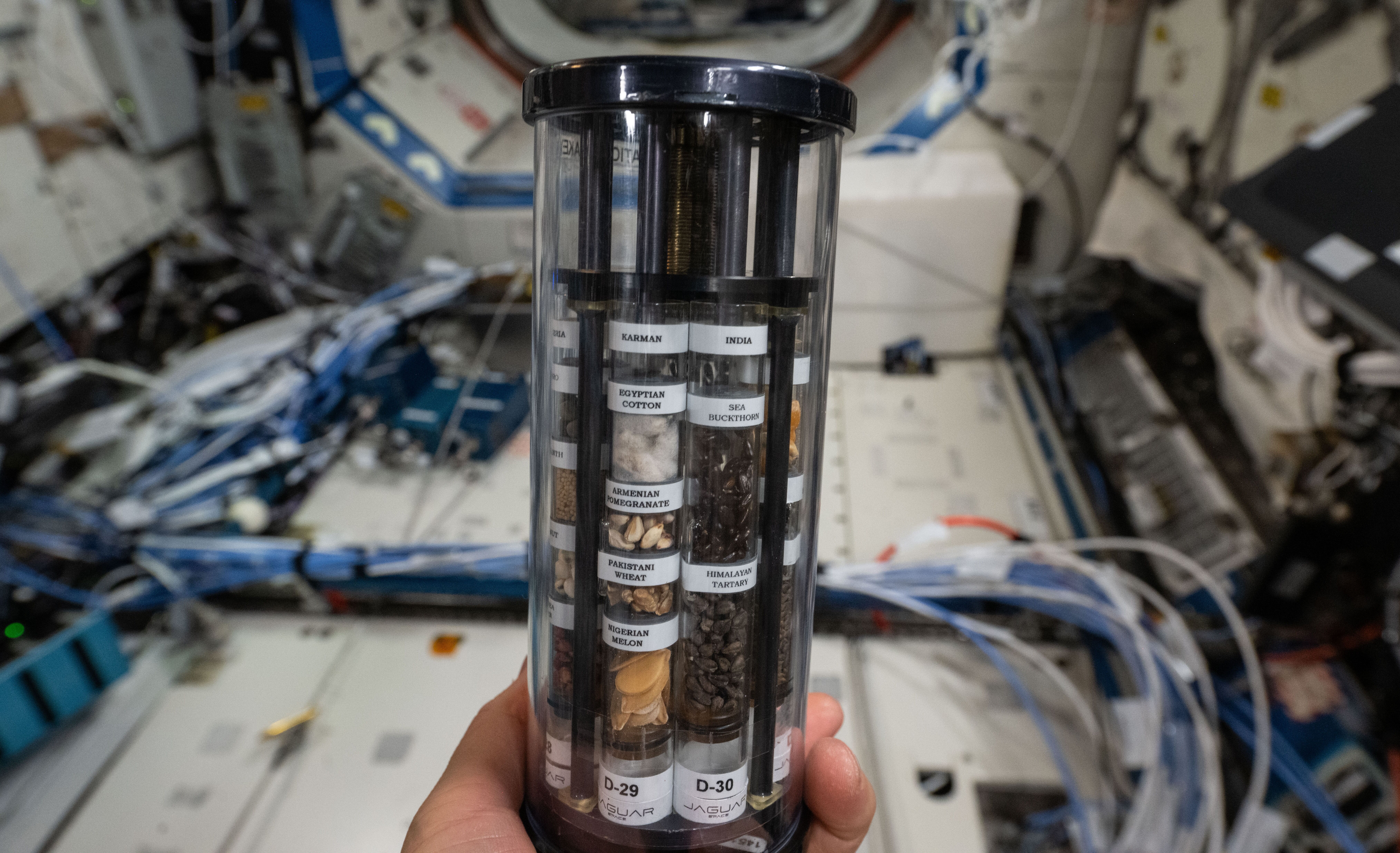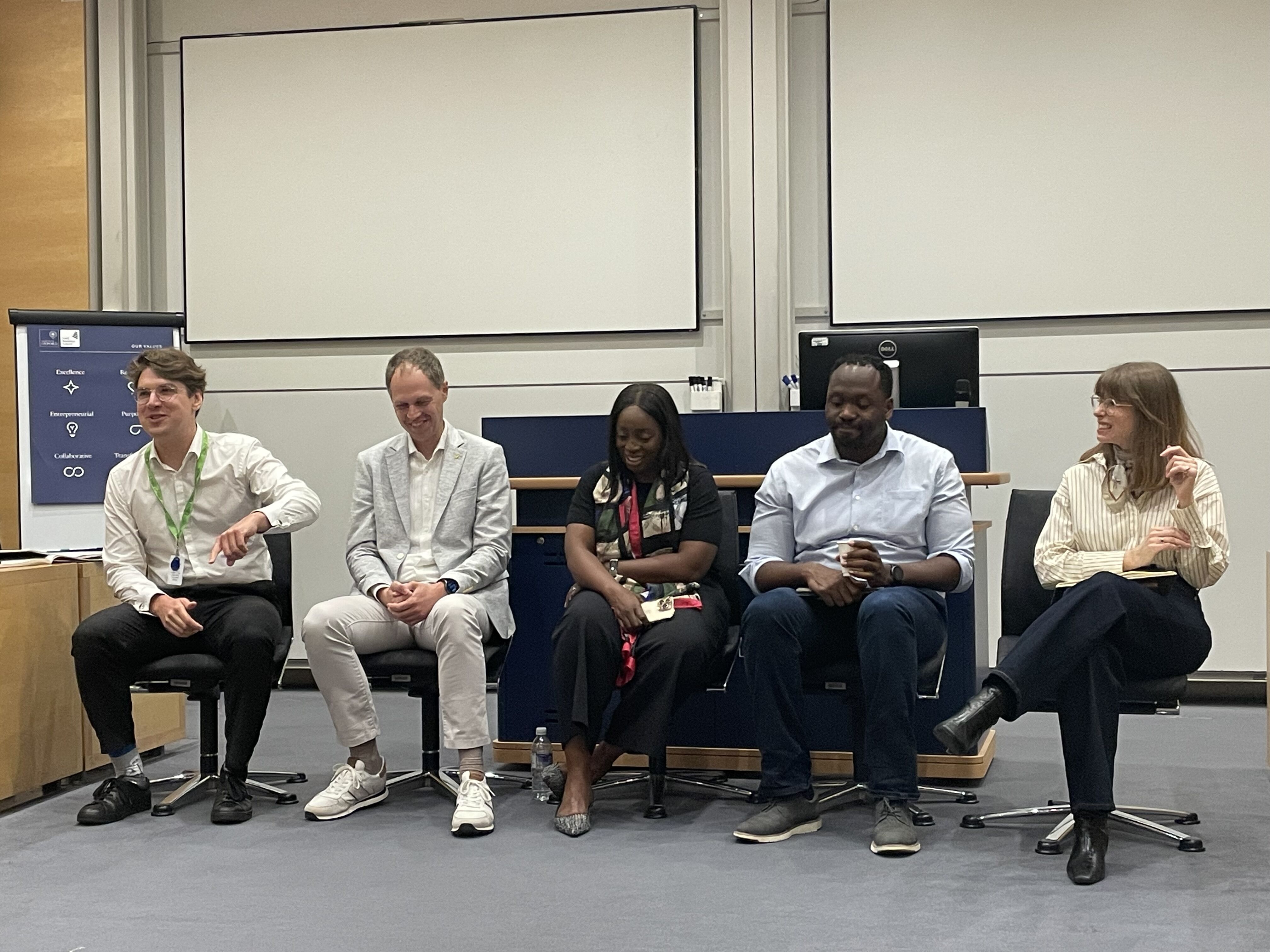By Hannah Ashford
In preparing for the upcoming Summit of the Future in September 2024, the United Nations (UN) Secretary General has observed that our collective problem-solving mechanisms do not match the pace or scale of the challenges we face. Today’s complex, interconnected, and rapidly changing world requires renewed efforts towards multilateralism, ensuring effective global governance for present and future generations. Indeed, for the space sector - which is experiencing unprecedented levels of private-sector activity - inclusion of non-state perspectives is not just desirable for robust governance, but critical.
To this end, The Karman Project was pleased to accept the invitation of the United Nations Office of Outer Space Affairs (UNOOSA) and the Portuguese Space Agency to contribute to two key preparatory events which allowed Member States, the private sector, and civil society to engage on the vital issues outlined in the UN Secretary-General's Policy Brief 7 “For all humanity: The future of Outer Space governance”. The Policy Brief identified, space debris, space traffic management and space resource activities as the most pressing challenges pertaining to space sustainability.
The Karman Project's Interventions
On behalf of The Karman Project, our Managing Director Hannah Ashford gave two addresses in March and May 2024 respectively - during the Policy Symposium, and during the Conference on the Management and Sustainability of Outer Space Activities. Both events, co-organised by UNOOSA and Portugal Space, brought together a diverse array of stakeholders to discuss the future of space governance. The Karman Project's interventions emphasised the crucial role of multistakeholder participation and consultation in decision-making processes related to space sustainability, safety, and security - and the need to move towards systemic integration of non-state actors into such processes. Key talking points included:
Informed Dialogue = Informed Decision-Making: We highlighted the importance of broadening the spectrum of stakeholders involved in space governance dialogue. The challenges we face in outer space—such as debris management, space traffic control, and resource utilisation—are complex and interconnected, and occurring within contracted timescales. Addressing these issues effectively requires the expertise and cooperation of not only governments but also private industry, academia, and civil society.
Executive Governance and Complementarity: The purpose of involving such stakeholders is not to replace the executive decision making role that states must play in shaping the future of governance, but rather it is an opportunity to elevate international rules, regulations and norms to other stakeholder communities. It is about complementarity; about feeding information, knowledge, understandings in and out of relevant fora.
Action: Increased awareness and transparency among non-state actors will increase ownership and responsibility, instilling a sense of urgency in existing roadmaps and workstreams. Non-state actors can also take steps on occasion where state actors cannot, and we cannot underestimate the power of incremental progress particularly when there may be a lack of political will from certain states at an executive level.
Trust: We can greatly improve the legitimacy and effectiveness of decisions and decision-making processes where there have been concerted and recognisable efforts towards diverse stakeholder inclusion.
The Role of Civil Society
This involves a radical shift in the way that we engage and cooperate internationally, as we rebuild trust in multilateralism through inclusion and accountability. Civil society organisations are particularly well placed to support and accelerate these efforts, playing a pivotal role in facilitating dialogue and building trust among diverse experts and stakeholders. By creating platforms for strategic discussions, organisations such as The Karman Project can foster mutual understanding and cooperation.
By bringing together diverse and curated stakeholders coming from both the public and private sector, organisations such as The Karman Project can facilitate forums for strategic dialogue and trust building, with the aim to increase awareness and common understandings for security, safety and sustainability in space - whilst encouraging partnerships, joint projects and tangible commitments between people coming from different disciplines and nations. In our case, we work with international astronauts, directors of space agencies, entrepreneurs, directors of commercial entities, researchers and others, currently coming from 60+ nations worldwide. The very basis of our foundation is multilateral engagement, creating as many touch points as possible for diverse decision-makers to accelerate trusted dialogue and cooperative efforts.
Our intention is to create safe spaces for interdisciplinary and international exchange, often utilising the Chatham House Rule which we have found to be very effective, to allow people to express themselves independently and listen. It allows room for courageous thinking and accelerated problem-solving around the future of space. And when we consider topics such as space resources, debris and traffic management - and the interrelation between sustainability, safety and security - the technical solutions are often there, but a lack of understanding and trust among stakeholders prevents us from moving forward with tangible solutions. To that end, opportunities for trust building - first with lower-risk environments, topics and issues, then moving onto more complex issues - cannot be underestimated.
Recommendations and Outcomes: The Lisbon Declaration
Key to our intervention was a recommendation for the Committee on the Peaceful Uses of Outer Space (COPUOS) - which we recognise as the appropriate convening authority for matters of space governance - to integrate non-state stakeholders in a more systematic manner. We looked to models such as the Arria Formula meetings convened by the Security Council to gather expert opinion and input in a confidential manner, and the International Telecommunications model which goes beyond observer status, and allows non-state actors to be full members of the International Telecommunications Union - enabling the right to chair, make proposals, etc. - and thereby generating more responsibility.
Such avenues would ensure that diverse perspectives are considered in the development of international norms and guidelines for space activities.
The conference culminated in the adoption of the Lisbon Declaration on Outer Space, which encapsulates the collective insights and recommendations of the participants. Notably, Recommendation 3 of the Declaration reflects the core message of our intervention: the necessity of multi-sector and meaningful multistakeholder participation in space governance. This recommendation calls for the creation of a dedicated platform within COPUOS to enable comprehensive engagement from all relevant parties.
The adoption of Recommendation 3 in the Lisbon Declaration is a significant achievement for the space sector, underscoring the impact of multistakeholder advocacy. It is testament to the power of inclusive dialogue and the vital role of civil society in shaping the future of outer space. As we move forward, it is essential to maintain this momentum and continue fostering collaborative approaches to space governance. The Karman Project remains committed to supporting these efforts, and commends UNOOSA and Portugal Space for its efforts in ensuring that the road to the Summit of the Future has been an inclusive and representative one.
To this end, The Karman Project was pleased to accept the invitation of the United Nations Office of Outer Space Affairs (UNOOSA) and the Portuguese Space Agency to contribute to two key preparatory events which allowed Member States, the private sector, and civil society to engage on the vital issues outlined in the UN Secretary-General's Policy Brief 7 “For all humanity: The future of Outer Space governance”. The Policy Brief identified, space debris, space traffic management and space resource activities as the most pressing challenges pertaining to space sustainability.
The Karman Project's Interventions
On behalf of The Karman Project, our Managing Director Hannah Ashford gave two addresses in March and May 2024 respectively - during the Policy Symposium, and during the Conference on the Management and Sustainability of Outer Space Activities. Both events, co-organised by UNOOSA and Portugal Space, brought together a diverse array of stakeholders to discuss the future of space governance. The Karman Project's interventions emphasised the crucial role of multistakeholder participation and consultation in decision-making processes related to space sustainability, safety, and security - and the need to move towards systemic integration of non-state actors into such processes. Key talking points included:
Informed Dialogue = Informed Decision-Making: We highlighted the importance of broadening the spectrum of stakeholders involved in space governance dialogue. The challenges we face in outer space—such as debris management, space traffic control, and resource utilisation—are complex and interconnected, and occurring within contracted timescales. Addressing these issues effectively requires the expertise and cooperation of not only governments but also private industry, academia, and civil society.
Executive Governance and Complementarity: The purpose of involving such stakeholders is not to replace the executive decision making role that states must play in shaping the future of governance, but rather it is an opportunity to elevate international rules, regulations and norms to other stakeholder communities. It is about complementarity; about feeding information, knowledge, understandings in and out of relevant fora.
Action: Increased awareness and transparency among non-state actors will increase ownership and responsibility, instilling a sense of urgency in existing roadmaps and workstreams. Non-state actors can also take steps on occasion where state actors cannot, and we cannot underestimate the power of incremental progress particularly when there may be a lack of political will from certain states at an executive level.
Trust: We can greatly improve the legitimacy and effectiveness of decisions and decision-making processes where there have been concerted and recognisable efforts towards diverse stakeholder inclusion.
The Role of Civil Society
This involves a radical shift in the way that we engage and cooperate internationally, as we rebuild trust in multilateralism through inclusion and accountability. Civil society organisations are particularly well placed to support and accelerate these efforts, playing a pivotal role in facilitating dialogue and building trust among diverse experts and stakeholders. By creating platforms for strategic discussions, organisations such as The Karman Project can foster mutual understanding and cooperation.
By bringing together diverse and curated stakeholders coming from both the public and private sector, organisations such as The Karman Project can facilitate forums for strategic dialogue and trust building, with the aim to increase awareness and common understandings for security, safety and sustainability in space - whilst encouraging partnerships, joint projects and tangible commitments between people coming from different disciplines and nations. In our case, we work with international astronauts, directors of space agencies, entrepreneurs, directors of commercial entities, researchers and others, currently coming from 60+ nations worldwide. The very basis of our foundation is multilateral engagement, creating as many touch points as possible for diverse decision-makers to accelerate trusted dialogue and cooperative efforts.
Our intention is to create safe spaces for interdisciplinary and international exchange, often utilising the Chatham House Rule which we have found to be very effective, to allow people to express themselves independently and listen. It allows room for courageous thinking and accelerated problem-solving around the future of space. And when we consider topics such as space resources, debris and traffic management - and the interrelation between sustainability, safety and security - the technical solutions are often there, but a lack of understanding and trust among stakeholders prevents us from moving forward with tangible solutions. To that end, opportunities for trust building - first with lower-risk environments, topics and issues, then moving onto more complex issues - cannot be underestimated.
Recommendations and Outcomes: The Lisbon Declaration
Key to our intervention was a recommendation for the Committee on the Peaceful Uses of Outer Space (COPUOS) - which we recognise as the appropriate convening authority for matters of space governance - to integrate non-state stakeholders in a more systematic manner. We looked to models such as the Arria Formula meetings convened by the Security Council to gather expert opinion and input in a confidential manner, and the International Telecommunications model which goes beyond observer status, and allows non-state actors to be full members of the International Telecommunications Union - enabling the right to chair, make proposals, etc. - and thereby generating more responsibility.
Such avenues would ensure that diverse perspectives are considered in the development of international norms and guidelines for space activities.
The conference culminated in the adoption of the Lisbon Declaration on Outer Space, which encapsulates the collective insights and recommendations of the participants. Notably, Recommendation 3 of the Declaration reflects the core message of our intervention: the necessity of multi-sector and meaningful multistakeholder participation in space governance. This recommendation calls for the creation of a dedicated platform within COPUOS to enable comprehensive engagement from all relevant parties.
The adoption of Recommendation 3 in the Lisbon Declaration is a significant achievement for the space sector, underscoring the impact of multistakeholder advocacy. It is testament to the power of inclusive dialogue and the vital role of civil society in shaping the future of outer space. As we move forward, it is essential to maintain this momentum and continue fostering collaborative approaches to space governance. The Karman Project remains committed to supporting these efforts, and commends UNOOSA and Portugal Space for its efforts in ensuring that the road to the Summit of the Future has been an inclusive and representative one.








